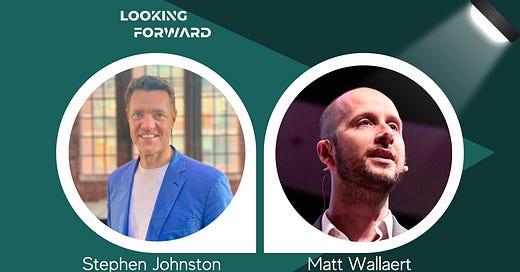Change AGEnt Profile: Matt Wallaert
LF58 | The innovative entrepreneur and network builder has seen behavior change from multiple angles, and is excited by the prospects in aging and longevity
Matt Wallaert is relatively speaking, one of the old guard. In a space that’s only 15-20 years old, Matt has more than a decade of front line experience working on applied behaviour change, across academia, startups, tech companies, insurance, consulting, as an author - and now as a convenor of a global collaborative network, BeSci.io. This gives him a good vantage point on this nascent space.
Changing behavior at Clover Health
Following stints as founder and in-house behaviour change scientist at various startups, Matt spent four years as Director of Behavioral Science at Microsoft, then became Chief Behavioural Officer Officer at Clover Health, a startup Medicare Advantage insurance provider that raised over $1bn and listed on NASDAQ.
Applied behavioural science is only 15-20 years old
He says Medicare is a great place to work on behavior change, because unlike other health insurance companies, Medicare patients don’t churn. “Medicare plans have 30 years to recoup the investments they make in your health”, he says. In this market, there’s every reason to try out innovative approaches that improve the lives of customers.
With the rise of big data, it’s becoming easier to actuarially identify the benefits of interventions the plans make, to decide whether they should be scaled up. The company, which was entirely focused on the senior population, even explored putting satellite offices in senior-focused apartment complexes, to do real-time behaviour change interventions.
$2 batteries can save lives
Often, he says, people race to chose technology solutions for behavior change when simples fixes will do. He relates one anecdote whilst at Clover Health, in which they decided to give their visiting nurses corporate credit cards and told them - within reason - to buy things they thought their patients needed. Then on the back end they reviewed the purchases and tried to understand what was going on.
One day, Matt noticed a purchase of just a few dollars for batteries, and when he asked the nurse about it, was told that this was for the patient’s glucose reader which had run out of batteries; the diabetic patient was ‘blind injecting’ insulin, based on guesswork. This could have been disastrous for the patient.
“Make it easy for people to do the right thing”
Whether the patient couldn’t afford batteries, or just forgot them, doesn’t matter, it showed how small barriers can have potentially major impacts. And likewise how removing barriers, “making it easy to do the right thing” can be so effective. They set up an automatic script to ship batteries from Amazon to their diabetic patients. In addition to the moral, ethical and human dimensions, the financial cost of the program for all patients - perhaps $20,000 over a year - was less than the cost of one of their patients entering ER.
Whilst at Clover, Matt explored partnerships with insurance companies in Japan and Taiwan, and was impressed at by the potential, yet feels there’s still a long way to go.
“No one’s doing good behavior change in US senior care”
Matt is shocked at how few good behavior change programs there are in senior living and long-term care programs. He cites research from the 1970s that showed the impact of putting a pot-plant in the rooms of nursing home residents and seeing a marked improvement in outcomes; people do better if they feel a (even small) sense of purpose.
This research is inline with Bill Thomas’ work, who’s consistently fought to change the model of nursing care. Yet it’s still very much the exception - hamstrung by bureaucracy and a lack of imagination. “There’s a huge need for experimentation and translational research in the long term care space”, Matt says.
Building industry capability with BeSci.io
After Clover, Matt was head of behavioural science at famed design consultancy Frog, then left to write his product-building book and start BeSci.io. This is a part-consultancy, part-association with a dual mission: it’s looking to create ‘smart demand’ (my term), educating buyers about the space, while supporting and enabling expert consultants to collaborate and be more effective.
BeSci.io is coordinated by Matt but the work is done by a collective of expert practitioners with day jobs, most of whom have current or former roles with applied behavior change at large corporates (including Cityblock Health, Betterment, CVS, GoodRx, Tandem and AIG).
BeSci.io is designed to operate on a breakeven basis, and operates more like an innovative trade association, in that it’s trying to upskill practitioners and improve the expertise of those seeking help.
The explicit and only goal with BeSci.io is capability building - helping other non-competitive organisations build their own expertise around this topic, rather than just implementing one-off projects, which may fail and cause the client to give up interest in the topic.
BeSci.io operates as a network, hosting a lively slack channel, running a global directory, creating a taxonomy to help people navigate the often confusing lexicon, and runs trainings and workshops for clients. They’re starting to do develop courses that can be asynchronous, to allow their small team to be more scalable. Matt hopes that more of BeSci.io’s work is in the ageing and longevity space, and is interested in connecting with corporates, governments and researchers who may want to help reinvent longevity from a behaviour change perspective.
The conversation with Matt underscored the importance to me of behavior change in the aging and longevity space. I’m excited to follow the BeSci.io model and hope to see more people think harder about how to make behaviour change happen.




